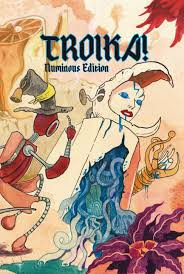I've actually been running games recently! Bully for me. I decided that I'd start reviewing the products I actually use - this was my first review on DrivethruRPG.

I've been running the sample adventure in Blood Sundown for the past few nights for players who are relatively new to RPGs and it has worked a treat. Everywhen's simple mechanics with little bookkeeping or arithmetic make it ideal for new or casual players, and the range of pregenerated characters included mean you can be up and running almost straight away. The sample adventure could probably be played in an evening if players most fast, but it'll have taken us three sessions of 2(ish) hours. The adventure itself is a good introduction to a 'Weird West' setting, and while everything needed is there on the page, there's no reason a GM couldn't put extra meat on the bones and turn the conflict between Dr Vitale and the townsfolk of Bliss into a longer campaign. The adventure does contain a section that implies some pretty basic information is hidden behind a dice roll, which is something that I try to avoid at all costs as a GM - player agency requires some information, even if it isn't complete or entirely correct - but that's an easy enough fix. You still need to reward characters who have, for example, the 'keen eyesight' boon or high Mind scores, but the reward cannot be the basic information required for action. That said, the adventure doesn't require the PCs to any particular thing for it to work, but that doesn't mean it is a railroad - Dr Vitale has his own plans and will put them into action if he can.
The rest of the book is a very good sourcebook for running a Western game using Everywhen. It doesn't have to be 'weird' - it'd be perfectly possible to run a 'historical' or 'Spaghetti' Western game using Everywhen and Blood Sundown, as long as it affords for competent protagonists (and even here, to add more grit to the game simply lean the balance of NPCs away from Rabble and towards Toughs and Rivals). The book includes a range of setting appropriate careers (as you'd expect from any Barbarians of Lemuria adaptation) some new equipment and setting appropriate rules (such as advice on how to handle a fast draw shootout), as well as a discussion of Faith and Magic appropriate to a 'Weird West' game, which would be well suited for 'weirding' other historical settings too. There's a fairly slim, but perfectly adequate bestiary of mundane animals and supernatural creatures.
I can recommend this both on its own terms, and an example of an Everywhen 'build'. I was a little underwhelmed by the examples in the core book, but that is par for the course when it comes to a system that aspires to be 'universal'. As an example build - and this, I expect, is true of all the recent Everywhen releases - Blood Sundown shows GMs what they can do fairly straightforwardly with the Everywhen engine.
As a final point; the layout is clean, the page decoration uses only greys and blacks, and the art is perfectly good black and white work and it all prints well. While I have stumped up for the PoD, before that was available I printed it 'booklet sized' on my home printer and found it worked well.












.png)























































